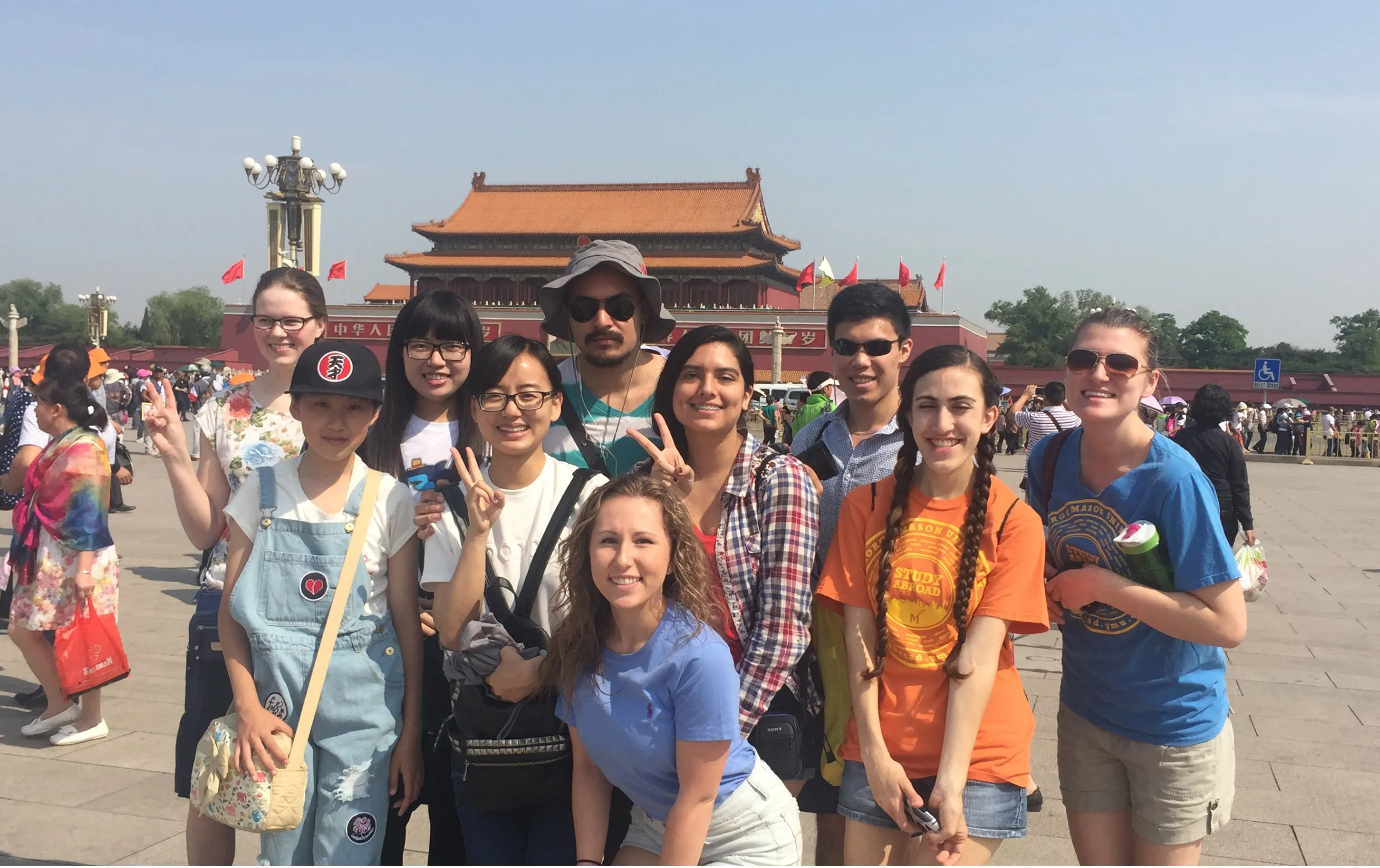中美语伴一席谈
2016-12-02吴星铎,于嬿华,李国磊等
中美语伴一席谈
Language Exchange Partners
中央民族大学与美国乔治梅森大学一直有游学项目的合作,在这个夏天,来自乔治梅森大学的7个美国学生与中央民族大学的7个中国学生两两结成语伴,在一个月的时光中互相交流、彼此帮助。5月25日,7对语伴来到《国际人才交流》编辑部,分享他们的跨文化友情故事。
The 7th meeting of the "World Speaking" club passed in the Minzu University of China. The Minzu University of China has a student exchange agreement with the George Mason University of the USA. This summer, seven George Mason University students became language exchange partners with seven Chinese students from Minzu University. They interacted with each other for a month, as well as helped each other. On May 25th, seven pairs of language exchange partners were invited to "International Talent" editor's department to share their stories on cross-cultural friendship experience.
主持人(Hosts):吴星铎(Wu Xingduo)、 于嬿华(Filiz Unal)
嘉宾(Guests):美国学生——李国磊 (Nikolai Lipnicky)、亮谦(Sam Richter)、赫连莉(Christy)、达娜(Dana)、汉娜(Hannah Smith)、夏侯琳(Jailene Cascante)、白美玲(Malin Beckering)中国学生——李伟康(Li Weikang)、黄璜(Huang Huang)、刘姗姗(Liu Shanshan)、姚绮(Yao Qi)、赵责屹(Zhao Zeyi)、许彤莹(Xu Tongying)、林韵琴(Lin Yunqin)

文化大不同
Big Culture Difference
夏侯琳:东西文化差异巨大,中国人信奉集体主义的思考方式,美国人则信奉个人主义。中国人把每个人都看作集体的一员,大家都彼此照顾。
Jailene: The difference between Oriental and Western cultures is really big. Chinese people believe in collectivism, and Americans in individualism. Chinese people see each as a crowd. They take
李国磊:关于小费也是一种文化差别。在中国,结账的时候很少付小费;在美国小费则非常普遍。最近我想买一双新运动鞋,李伟康帮我在淘宝上网购了一双。他费了很多时间,所以我要给他一些小费。
李伟康:我帮他买的鞋,价格是109元。他昨天给了我120元。我问他为什么给我120元,他说那是小费。我坚决退还给他。我说,这是在中国。
刘姗姗:吃饭的时候,我们的美国语伴们习惯自己点一份菜吃。就算是大家都点了很多,他们也把想吃的都放在自己的盘子里,然后吃自己盘子里的菜。我们教了他们在中国的饮食习惯,大家一起用餐。
赵责屹:他们通常不吃动物内脏,包括动物的血。比如我曾经极力推荐鸭血粉丝汤,但我的语伴断然拒绝,因为她不吃动物的血。有一回我们晚上出去吃串,点了一份涮肚,跟他们说这是猪的胃。吃了一口之后,我这辈子都忘不了他们脸上的那种表情。care of each other.
Nikolai: There is culture difference when it comes to giving tips. In China, when you ask for a bill, you normally don’t give a tip. But in the USA giving tips is very common. Recently, I wanted to buy a pair of sports shoes. Li Weikang helped me to get them from Taobao. He spent so much time helping me out, and that was why I wanted to reward him with a tip.
Li Weikang: I helped him to buy shoes, the price was 109 RMB. Yesterday he gave me 120 RMB. I asked him, why 120 RMB? He said it was a tip, I returned the money to him, saying, this is China.
Liu Shanshan: When we go out to eat, my American language partners order one dish for themselves. Even if everyone ordered a lot of food, they still would stick only to what they ordered for themselves. We taught them the Chinese way of dining out, when everyone shares their ordered dishes.
Zhao Zeyi: They normally don’t eat internal organs of animals, including animals’ blood. For example, once I agitated for a restaurant nearby the university that served duck blood vermicelli soup, but my language partner categorically refused, because she doesn’t eat animals’ blood. Once at night we went out to get some “chuanr”, we ordered, what I told them, the pig’s stomach. After they have tried it, I will never forget the expression on their faces.
语言生妙趣
Language is a source of humor
达娜:汉语有四声,所以我说中文的时候,姚绮常常听不懂。比如有一次我要吃“面条”,却说成了“棉条”,我重复了很多遍她才听懂。
赵责屹:还有音调以外的错误。有一次到了地铁站,汉娜跟我说:“那是‘人口’,对吗?”我一看,写的是“入口”。
姚绮:我一直分不清“零食”和“蛇”,他们每天纠正我,我第二天还是分不清。他们教我和彤莹说“蹲下(squat)”那个单词,我俩一直在那儿练,他们总说不对不对,最后我俩只好放弃了。
许彤莹:亮谦有一次问我,“煎鸡蛋”在中国很有名吗?我蒙了,这个问题很奇怪,“煎鸡蛋”只是一种鸡蛋的烹饪方法,谈不上有没有名。后来他拿出手机,我看到在手机上搜索出来一个中国武打明星:甄子丹。
赵责屹:每天大家齐刷刷地把手机拿出来查字典的时候,就是看菜单的时候。
许彤莹:我跟他们经常中文、英文、手势再加上图画给他们解释。有一次吃烧烤,我们点了
Dana: There are four tones in the Chinese language, that’s why when I speak Chinese, Yao Qi sometimes doesn’t understand. For example, once I wanted to eat “mian tiao” (noodles), but I pronounced it like “mian tiao” (cotton sliver). I repeated several times, and only then she understood what I meant.
Zhao Zeyi: There are also some mistakes not connected to the tones. Once we arrived at the subway station, Hannah said to me:“There is ‘ren kou’ (population), right?” Then I saw it here was written “ru kou” (entrance).
Yao Qi: I can never differentiate “snake” from “snack”, they correct me all the time. The next day I still make the same mistake. They taught me and Tongying to pronounce “squat”, we practiced there all the time, but they still insisted we were saying it wrong. At last we gave up.
Xu Tongying: Once Sam asked me, are “fried eggs (“jian jidan”)”popular in China? I was puzzled, this question sounded weird, fried eggs is only a method of cooking eggs, we normally don’t discuss its popularity. Later he took out his phone, I took a look at what he was searching for. It was the Chinese martial arts star Zhen Zidan.
Zhao Zeyi: Everybody needs the dictionary especially when looking up words on the food menu.
Xu Tongying: I frequently use Chinese, English, gestures and even一份“掌中宝”,就是鸡爪或鸭爪掌心的那块脆骨,解释了很久都不明所以,我俩查词典也解释不了。后来我给他们画了图。
林韵琴:点菜学英语这件事我也印象深刻。我读的学科是英语教育专业,以后要教中小学生。这次交流给我非常大的启示,以后教学生一定要多教他们在生活情境中学习英语。
李伟康:我从我的语伴那里学到一句英文俚语:睡懒觉(sleep in)。
赵责屹:中国的“说曹操曹操到”,在英文里面也会有一个相对应的说法:“Speak of the devil”。
许彤莹:有一次去故宫,想给他们解释“后宫佳丽三千,独得皇上恩宠”,我觉得好难啊。
赵责屹:有一天我们看见一个标语上面写着“多一点低碳,少一点‘霾’怨”。我尝试解释双关的含义,但貌似不怎么成功。
汉娜:我学到中文的绕口令“吃葡萄不吐葡萄皮,不吃葡萄倒吐葡萄皮”,英文也有类似的:“她在海滩卖海贝壳。她肯定她卖的贝壳是海贝壳(She sells sea shells on the seashore. The seashells she sells are seashells she is sure)”。
pictures to help them understand. Once we were out eating roast duck, we ordered “zhang zhong bao” which is chicken and duck claws. I explained to them for so long, we looked it up in the dictionary but all was in vain. So I drew it for him instead.
Lin Yunqin: Learn English by menu gave me a very deep impression. I learn teaching English Major, after graduation will be teaching primary and middle school students. That time I was left with an idea that later I will for sure teach my students some real life English words.
Li Weikang: I learnt from my language partner a word “sleep in”.
Zhao Zeyi: The Chinese saying “Talk about someone, and he appears” also has an equivalent in English, “Speak of the devil”.
Xu Tongying: Once we were visiting Forbidden City, wanted to explain to them “The emperor has more than three thousand concubines, but only loves one”, I think it’s very hard.
Zhao Zeyi: One day we saw a slogan “More low–carbon,less complain” (“complain “has similar pronunciation with “haze” in Chinese). I tried to render its meaning, but was not successful.
Hannah: I learnt a Chinese tongue twister, in English we have a similar one: She sells sea shells on the seashore. The seashells she sells are seashells she is sure”.

中美语伴左起:李伟康和李国磊、黄璜和亮谦、刘姗姗和赫连莉、姚绮和达娜、赵责屹和汉娜
语伴谈语伴
Language partners discuss each other
黄璜:语伴是我的灵魂伴侣
关于“语伴”,最开始是指“语言交换”层面的伙伴,但我觉得“语伴”事实上超越了“语言交换”的定义,因为有人和人的情感融入其中,而单纯机械的语言交换并没有用心在交流,因此,我认为语伴其实是一种灵魂伴侣。我的语伴亮谦长得像好莱坞明星,像《荒野猎人》里的主角,他刚开始有点内向,但现在话越来越多。他就像一本书,书的封面很厚,但是假如你翻开了这本书,与他成为灵魂之友后,就会发现这本书充满了黄金和钻石。
Huang Huang: My language partner is my soulmate
As for the term “language partner”, at first it solely meant “language exchange” between two people, but now, I think, it already surpassed this notion, because when feelings appear, the mechanical language exchange process is no longer necessary. With this regard, I think, language partner is a soul-mate. My language partner Sam reminds me of Leo Di Caprio’s character in “The Revenant”. At first, Sam seemed to me a bit introvert, but now he is getting more and more lively. He is like a book to me which seems too thick at the beginning, but when you start reading it and making it your soul-mate, you discover it is full of gold and diamonds.

中美语伴左起:许彤莹和夏侯琳、林韵琴和白美玲
白美玲:语伴帮助我们欣赏中国
语伴们给我们的是一种完全融入中国的体验。和语伴的交流中,我们听到了很多关于中国真实的动听的故事,从这些故事中,我们了解到了中国的更多方面,而并不是仅仅说“在中国,我去了传说中的长城”。他们帮助我们从不同的角度欣赏中国。
夏侯琳:语伴是我在中国可以亲近的人
我参加这个游学项目的理由之一就是有语伴。就算在自己的国家,也常常会遇到文化冲突。因此在另一个国度里,有一个可以亲近的同龄人,我们一起聊天,一起娱乐,这让我非常安心。
李伟康:语伴是我的“双胞胎”兄弟
我的语伴李国磊很特别,我觉得他简直是我的“双胞胎”兄弟。刚开始是因为我们俩体型就比较接近,后来才知道我们俩是在同一年来到这个世界上,兴趣爱好方面,我喜欢篮球,他喜欢滑板,都是比较擅长运动。从语伴到兄弟,我们用的时间很短。
(中文整理:吴星铎、周京锦、吴玺,英文整理:苏莉)
Malin: Language partners make us admire China
Language partners help us to blend in the Chinese culture. In the process of communication, one can hear interesting genuine stories about China. By this stories we get to know China from different aspects, so that I can say about China more than “I have been to the legendary Great Wall of China”. A language partner helps us to enjoy China from different angles.
Jailene: My language partner is my closest person in China
One of the reasons why I took up the exchange program was to find the language partner. Sometimes, even in my own country, I might encounter the culture shock. That’s why in another country, it’s better to have someone of your age, someone close to you, to chat, to have fun together. That way it makes me feel relieved.
Li Weikang: My language partner is my “twin” brother
My language partner Nikolai is very special, I even think he is my twin brother. Firstly, we thought we looked alike, and later found out that we were born in the same year. And as for our hobbies, I’m good at basketball and he is good at snowboarding, we both love sports. We went the way from being language partners to brothers within a short time.
(Chinese version: Wu Xingduo,Zhou Jingjin,Wu Xi; English version: Anastasia Sukhoretskaya)
